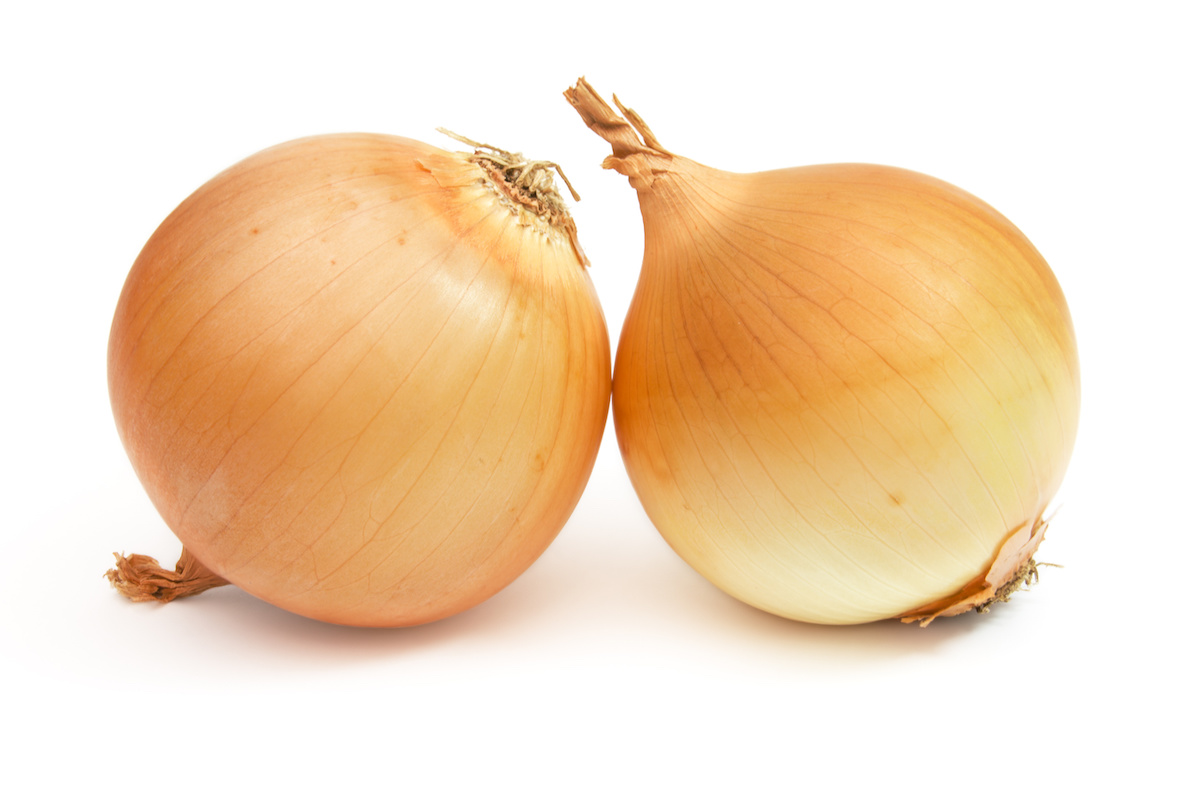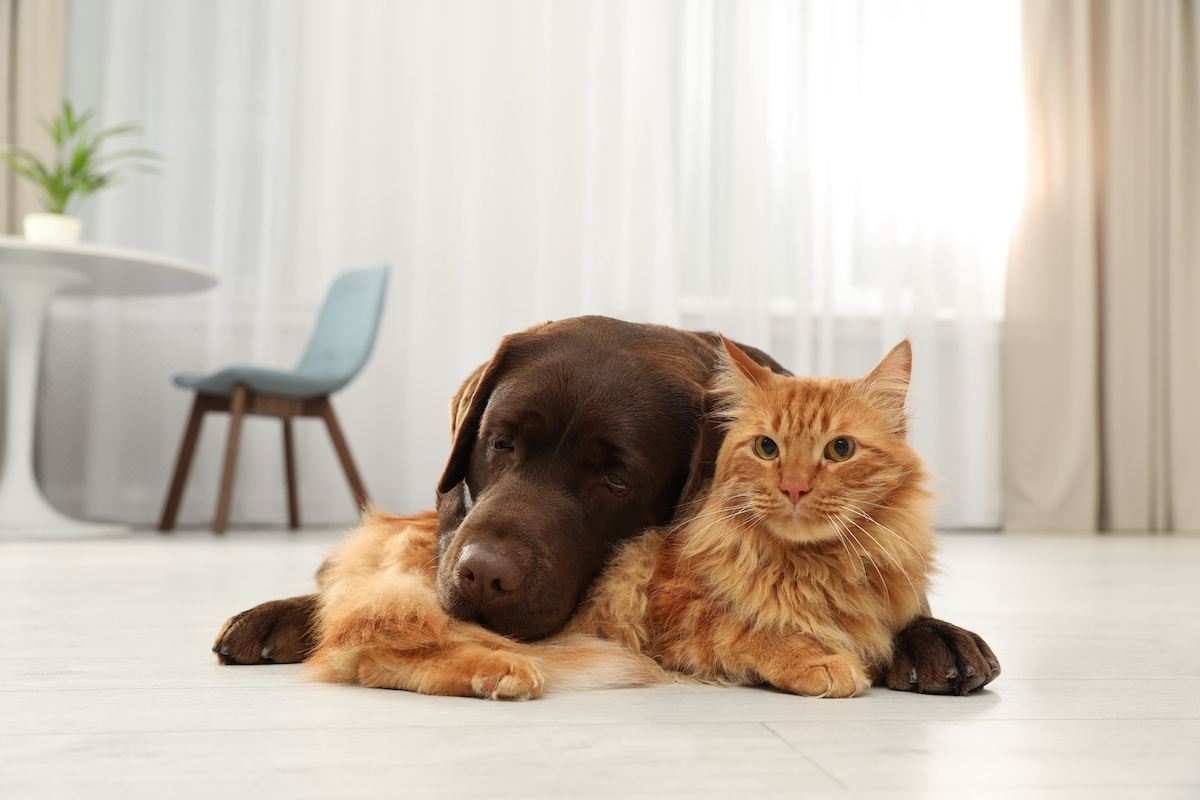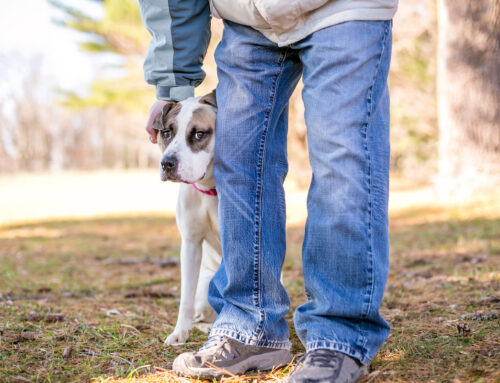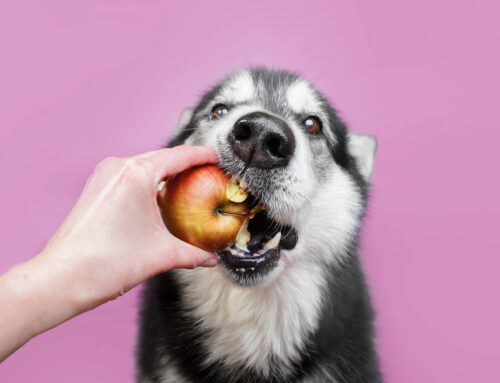Did you know that March is Pet Poison Awareness Month? Unfortunately, there are many seemingly innocent foods and other objects around the house that can poison your pet.
When a pet is poisoned, it’s a very scary situation and time is of the essence to get your pet the help they need. For Pet Poison Awareness Month, we’re going to talk about poisonous foods, household cleaners, and plants that you need to keep away from your dog or cat.
It’s very understandable that you have concerns about your pets’ safety. The fact is, most dogs and cats are curious and will explore the world around them. Unfortunately, that means they’ll taste and chew basically anything they come across. Keep in mind that pet safety is a year-round concern.
What is Pet Poison Awareness Month?
First, let’s talk about Pet Poison Awareness Month and what it means for pet owners like you.
Pet Poison Awareness Month is an initiative by the Animal Poison Control Center (APCC) to remind pet owners about dangerous toxins and poisons for pets. During this month, it’s a great time for pet owners to take diligent inventory of potentially toxic chemicals and foods around the house.
This helps to reduce the risk of harmful pets being exposed to household products that are poisonous to them. Most of these cases are accidental, but these incidents are commonly preventable.
During the month of March, the ASPCA and the Pet Poison Helpline team up and increase efforts to raise awareness about the most common poisonous household products that can harm our four- and two-legged family members.
Pet Poison Awareness Month is not about blaming pet owners for failing to keep their pets away from common household items. With all of the products we use in our homes and yards, it is impossible to prevent accidents from happening.
Pet Poison Hotline
Hopefully, you will never need to call the pet poison hotline. However, in case of the event of an emergency, we are providing you with this number now. The Pet Poison Hotline (1-800-213-6680) can help you learn how to keep your pets safe.
Pet owners can call the hotline to get immediate help with questions about pet poisoning.
The Pet Poison Hotline is a service of the Animal Poison Control Center and requires an annual membership fee. It also offers 24/7 access to veterinarians with expertise in treating pets.
What Foods are Poisonous to Pets?
There is a long list of potentially poisonous foods for pets, but it’s important to educate yourself. This way, you’ll know to seek emergency care if your dog or cat consumes any of the following foods.
If you’re not sure if a food is safe for your dog or cat, check with your vet. As it’s better safe than sorry. Here are just a few foods that can be harmful to cats and dogs:
- Avocado
- Grapes and Raisins
- Macadamia Nuts
- Chocolate
- Onions, Garlic and Chives
- Salt and Saltwater
- Gum and Candy
- Yeast Dough
- Milk and other Dairy Products

In many cases, a veterinarian will induce vomiting and administer activated charcoal to minimize the effects of these poisons.
One of the most widely-known food poisons is chocolate. Chocolate contains theobromine, which can cause symptoms similar to those of caffeine, including vomiting and diarrhea.
These dangerous foods can be found in a variety of places, including garbage cans, countertops and floorboards, pet supply stores, nature, and more.
Always be mindful of your pet’s surroundings. You also need to be aware of the foods that might harm your pet as you’re cooking (chocolate, onions, garlic, raisins, and macadamia nuts are most notable). When in doubt, do not feed it to your pet.
What Medications are Poisonous to Pets?
You should not attempt to give your cat or dogs medication intended for humans without medical advice. Please do not try this before contacting our office.
Human medications can be very dangerous for animals. If your pet consumes a medication that is not intended for animals, you should contact your local veterinarian. Here are a few medications that are poisonous to pets: acetaminophen (e.g. Tylenol) aspirin ibuprofen (e.g. Advil) Tylenol-3 or extra strength Tylenol (e.g. Tylenol Severe Allergy)
On rare occasions, aspirin can cause severe damage to the lining of the stomach and esophagus, but it’s rare to see this side effect. Aspirin will make your dog or cat sleepy and lethargic, but they can suffer liver damage and ulcers.
Any medication that is not specifically intended for pets is likely to cause severe side effects or even death.
Household Items that are Toxic to Pets
Now that you know about food and medications that are toxic to pets, you’ll also need to think about common household items such as cleaners. These can also be toxic to both dogs and cats. It’s important to keep these locked away where your pet can’t find it.
Bleach
The biggest offenders are things like bleach, which contains the ingredient sodium hypochlorite. Cats are especially sensitive to this and can become ill or die from even a small amount of bleach.
Cleaning products also contain corrosives and acids such as ammonia, chlorine, and acid that can burn your pet’s sensitive skin. Bleach poisoning is quite serious, although diluted bleach is less toxic. Either way, seek medical attention immediately if your pet drinks bleach.
Antifreeze
Another common source of problems is antifreeze. The sweet taste makes it tempting to pets, but the ingredients are extremely toxic. Antifreeze can cause kidney damage. Depending on the dose ingested, symptoms can be seen as early as 12 hours minutes or as late as up to 2 days.
Antifreeze (ethylene glycol) is often contaminated with ethylene dichloride (EDC), which is a known carcinogen and has a sweet taste. The amount of antifreeze that is lethal to dogs or cats is only slightly larger than the amount of antifreeze in an average antifreeze spill. Roughly a teaspoon can poison a cat and up to 3 tablespoons can poison a dog 15-pound dog.
If an animal has consumed Antifreeze, take it to a vet immediately.
Antifreeze Poisoning Symptoms
If you suspect your pet may have ingested something toxic, you should look for the following signs.
- Diahrehhea
- Depression
- Fainting
- Nausea
- Vomiting
- Rapid Heartbeat
Poisonous Plants for Cats and Dogs
What plants are poisonous to cats and dogs? Take a look at some of the common houseplants that are toxic to your pets.
Snake Plants
Snake plants are toxic to dogs and cats. However, the plants are also more toxic to dogs than cats.
Lillies
Are lilies toxic to cats and dogs? Lilies are toxic to cats and dogs. They are members of the lily family -lilies, true lilies, Asiatic lilies, Easter lilies, tiger lilies, daylilies, and Peace lilies. The amount of toxin in a lily will vary depending on the type and variety of lily. Some lilies are more toxic than others.
Tulips
Tulips are poisonous to cats, dogs and horses. The stems, leaves, and bulbs of the tulip plant can cause vomiting, diarrhea, and possibly death.
Azalea
Is Azalea toxic to cats and dogs? Azaleas contain a toxic compound called grayanotoxin. Cats, dogs, and humans are all susceptible to this compound.
The toxin binds to sodium channels in the muscles, heart and the central nervous system. Symptoms of grayanotoxin poisoning include muscle weakness, vomiting, blurred vision, drooling, and difficulty walking. In cats, because their heart is so sensitive to sodium channel binding, heart issues are most prominent.
What are Some Pet-Friendly Plants?
Just because you have pets doesn’t mean that you can’t have plants. The good news is there are several pet-friendly plants that you can have in your home. The trick is to find the ones that are least likely to be ingested. If you have a dog that is particularly fond of nibbling on plants, you may want to reconsider some of the more common plants such as the lovely African violet.
Other houseplants that are safe for pets include:
- Rattlesnake Plant
- Spider Plant
- Parlor Palm
- Ponytail Palm
- Bird’s Nest Fern
- Boston Fern
- Venus Flytrap
- Orchid
Keep Pet Poison Awareness Month at Top of Mind
It’s important to keep Pet Poison Awareness Month at the top of your mind not only in March but all year long. The best way to save a pet from being poisoned is by preventing it from happening in the first place. If you suspect that your cat or dog ingested something toxic, please contact our office immediately or seek emergency medical care.







